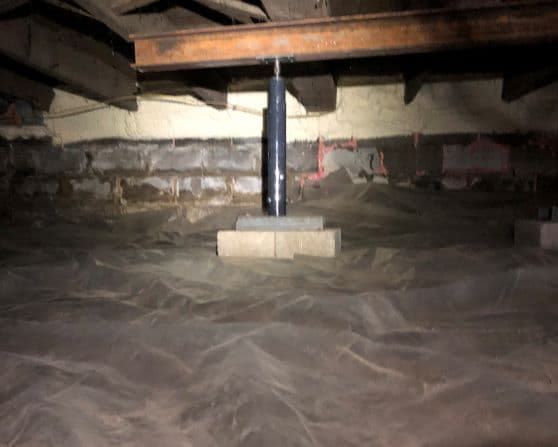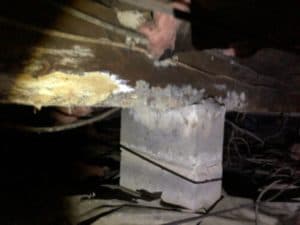Does My Crawl Space Need a Vapor Barrier?

Originally posted 7/30/20; updated 12/15/22
At first glance, a vapor barrier may seem trivial. You don’t spend any significant time in your crawl space, so you don’t care if it’s damp or smelly. There’s a layer of flooring and insulation between you and the crawl space- isn’t that enough?
Unfortunately, the answer to that is a very big, very loud, shout-it-through-a-megaphone NO. A vapor barrier, also known as a moisture barrier, is actually the bare minimum protection you should have in your crawl space.
Acculevel has been repairing foundations and waterproofing crawl spaces since 1996. The fact that we’re pushing you to have a vapor barrier probably seems highly convenient, if not actually suspicious. But in reality? We are trying to help you avoid expensive repairs to your home. Without proper care and maintenance (like a vapor barrier), your foundation can sustain significant damage. Not convinced? That’s okay- just keep reading.
So What is a Vapor Barrier, and Why Do I Need One?
A vapor barrier is a plastic liner that covers the dirt “floor” of your crawl space. Its purpose is to block vapors and moisture in the soil from getting into your crawl space.
This is important for two reasons:
- The air in your crawl space gets into your home. Your house is made of materials that are porous: wood, concrete, even fiberglass insulation. Additionally, the air that your HVAC unit circulates is pulled -at least in part- from the crawl space. When you or someone in your family has a respiratory condition, air quality is a major concern. If you’d like more specific details about air quality, we have an article that explores this topic here.
- Porous materials don’t just allow air circulation- they can also let in moisture. And moisture is the enemy of a healthy home. Damp air allows mold to grow, forces your HVAC system to work harder, contributes to the decay of your wooden flooring structure, and draws the interest of damaging insects. (Not-so-fun fact: termites prefer wood softened by moisture.) Want a more thorough explanation? We describe how moisture in a crawl space causes damage in this post.

This photo was taken by an Acculevel project advisor during a routine estimate. The vapor barrier has decayed, allowing moisture to feed mold and contribute to decay in the main beam.
If you have questions about waterproofing, sagging floor issues, or unpleasant odors in your crawl space, consult our comprehensive Crawl Space Repair Guide for Homeowners!
How Do I Install a Vapor Barrier?
Provided you’re not claustrophobic, installing a vapor barrier is a project most homeowners can DIY. You will need to calculate the square footage of your crawl space, so you can buy the appropriate amount of liner. You can find a wide range of options at home improvement stores, varying in color, material, and thickness. We recommend using a material with a 6 millimeter thickness; it will last longer than thinner liners.
The crawl space “floor” should be free of debris before you begin; any trash or failing insulation should be removed. Once you have a cleared work space, you will need to unroll the plastic sheeting and lay it out evenly across the “floor.” The barrier should be thick enough that it doesn’t try to roll up on itself, but you may want to set a rock on it in the corners to secure it.
I do want to caution you that this is not a one-and-done type of project. The average vapor barrier only lasts 5-10 years before it begins to break down and deteriorate. If you are not inclined to crawl around under your home, you can readily hire a contractor instead. Acculevel uses a 6 millimeter thick plastic and the cost is approximately $2-$4 per square foot (depending on the amount of debris removal).
What if I Find an Issue in My Crawl Space?
Hopefully, when you install (or replace) the vapor barrier in your crawl space you’ll notice a significant improvement in air quality. The air in your home should become less humid, odors should dissipate, and your HVAC bill may even lower.
But if this doesn’t happen, or if you find signs of a developing problem, you will probably have more questions. Here are the most likely issues and additional resources:
- Water in your crawl space: if you have more than just dampness in your crawl space, a vapor barrier is not sufficient. It’s only meant to stop moisture, not water. If you have puddles of water under your home when it rains, you will need waterproofing. As rainwater collects in your crawl space, it will cause the vapor barrier to float around and render it ineffective.
- Insulation falling down? In the How To Install section, I mentioned that you’ll need to remove any failing fiberglass insulation. If a substantial amount of this has fallen, or if you have cold floors in the winter, you should consider spray foam insulation instead.
- Dehumidifier Needed? Every midwesterner knows how humid summer can be in the Heartland. If you install a vapor barrier, but the air still feels clammy, it may be time for a dehumidifier. We explain how to determine the right size dehumidifier in this blog, and have a list of the top 5 dehumidifiers available to consumers here.
- If you find mold, please do not try to remove it yourself. For your safety, please have it evaluated by a professional, first. We explain how mold removal and remediation is done, provide pricing, and describe options in this article.
Does Your Crawl Space Need Repairs?
If you happen to be one of the 16 million Americans who struggle with claustrophobia, you may not want to install your own vapor barrier. In that case, you will want to find an experienced local company, and request a quote. Most contractors and waterproofing companies provide free estimates; make sure they provide the quote in writing, and clarify how long the pricing is valid.
Not sure about hiring a contractor? In this blog, we’ve detailed the questions you should ask a contractor and provided our answers. We also include a free downloadable form that you can use with other contractors, to verify that you are making the best choice for you and your home.
Before you sign a contract for any service, you should always verify the company is reputable, insured, and accredited by the Better Business Bureau.
If you live in Indiana or the surrounding states, contact Acculevel. We specialize in waterproofing and foundation repair, and provide free written estimates. Our quotes are valid for a year after issue, and we offer the best warranties in the business. We will schedule an appointment for you with one of our experienced project advisors; they will evaluate your home and recommend the best course of action for you, to keep your home strong and healthy for years to come.